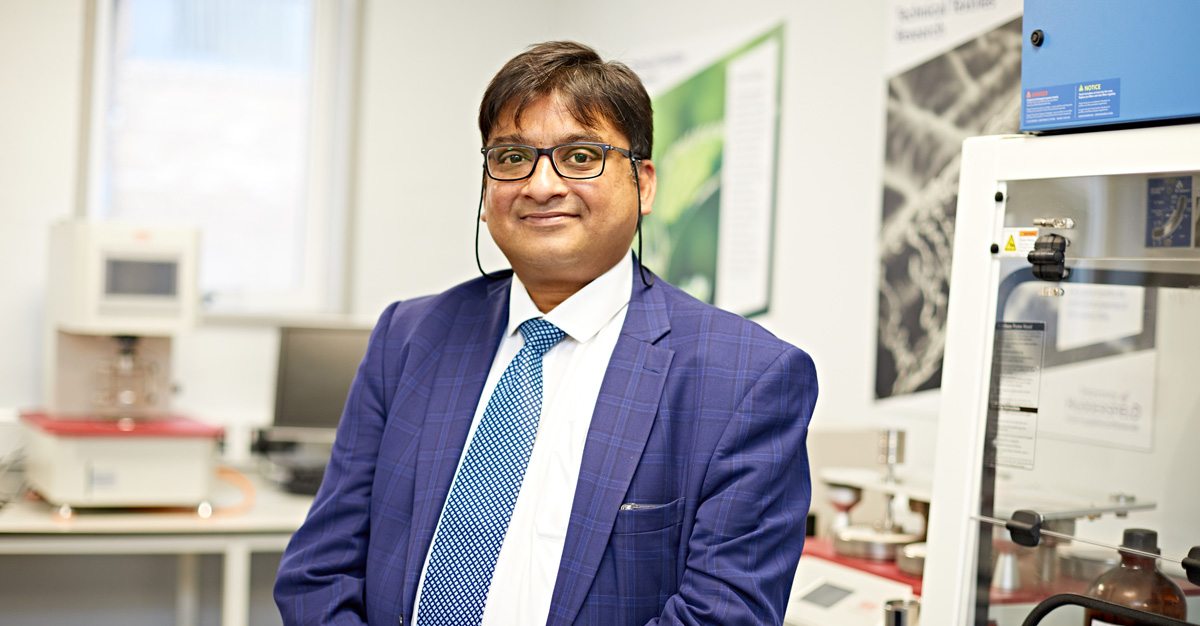Led by Professor Parik Goswami, the Technical Textiles Research Centre raised its global profile at the international symposium organised by EDANA, the leading worldwide association for nonwovens
A RESEARCH centre at the University of Huddersfield is taking the UK’s centuries-old textiles heritage into the future, proving a boost to the economy. Based in a large suite of labs newly-equipped with advanced technology, it focusses on ways that textiles can be re-engineered so that they help to address serious global challenges, such as the need to reduce dependence on single-use plastics.
Now, the Technical Textiles Research Centre (TTRC) – an inter-disciplinary team headed by Professor Parik Goswami – is raising its global profile. It made a big impact at the latest conference of EDANA, the world’s leading textile association for nonwovens and related industries, with a 250-plus membership that includes multi-national companies.
Professor Goswami, who is a leading authority in fields such as the use of chemistry to expand the functionality of textiles, has become a member of EDANA’s support group for innovation and research and development. The Technical Textiles Research Centre is also a centre of excellence in EDANA.
At the organisation’s recent Nonwovens Innovation Academy, held in the German city of Esslingen, Professor Goswami delivered an address that covered topics including new materials for sustainability and how cellulose and other polysaccharides can be used for novel medical textiles.
Innovations in nonwovens
Professor Goswami and the TTRC are supported by Grow MedTech, a major UK programme providing specialist support for innovation in medical technologies, involving a consortium of six universities across the Leeds and Sheffield City Regions.
The topic is vital because it explores how cellulose, a natural polymer, can be used to replace plastic materials in the production of single-use products such as wipes used in hospitals.
“They are normally made of nonwovens and at the moment the industry depends on polypropylene,” said Professor Goswami. “There is a lot of pressure for polypropylene to be removed and that instead we should start using cellulose materials. We are at the forefront of this research and without an alternative, the whole healthcare system will be at risk because of hospital-acquired infection.”
In addition to his talk at the Nonwovens Innovation Academy, Professor Goswami also moderated a session on various novel applications for nonwovens and the event also featured a stand describing the work of the University of Huddersfield’s Technical Textiles Research Centre. This was staffed by Dr Sohel Rana, a member of the centre who lectures in technical textiles.
The stand created a great deal of interest from companies, said Professor Goswami, and one of the objectives of his research centre is to forge industrial partnerships. The Centre’s membership includes academics, researchers and PhD students who are expert in a wide range of disciplines, not only technical textiles, but also subjects that include engineering, digital technologies, textile processing, medical textiles, chemistry and pharmacology.
The Centre has responded to the needs of industry by developing a new Master’s course titled Product Innovation with Textiles. Also, important international research links are being developed with universities such as the Indian Institute of Technology in Delhi.
More Stories
Technical Textiles Research Centre launched
Professor Parik Goswami is the founder and Director of new Technical Textiles Research Centre
Uni experts at major wound care conference
The 6th International Skin and Infection Prevention Conference was titled Innovations in Wound Management: Welcome to Tomorrow’s Reality
Innovations in lower urinary tract symptoms
Dr James Williamson and digital innovations company Elaros united to produce a measurement device for to benefit LUTS sufferers

